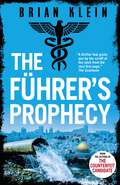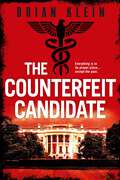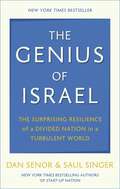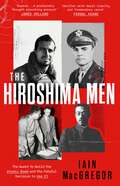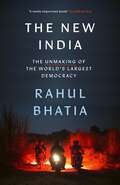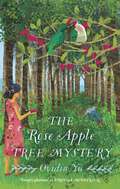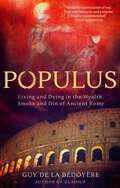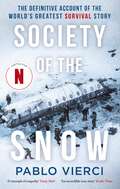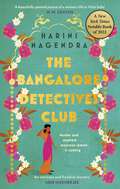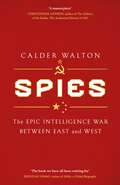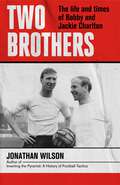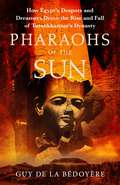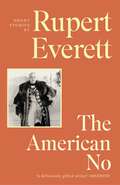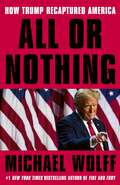- Table View
- List View
The Führer’s Prophecy (The Reich Trilogy)
by Brian KleinJanuary, 1939Adolf Hitler makes an infamous speech at the Reichstag threatening 'the annihilation of the Jewish race in Europe'. This vile public proclamation is seized upon by his fanatical supporters who christen it 'The Führer's Prophecy'.November, 1943A sinister plot hatched inside Block 10 of the notorious Auschwitz deathcamp is known only to a handful of Nazis as Operation Gesamtkunstwerk. It's a plan originated by Hitler, Himmler and Mengele and now, almost eighty years later, it's finally ready to be actioned by the direct descendants of the Führer.April, 2022As the world emerges from the Covid pandemic, an encrypted zoom call involving five participants, based across four continents, approves a plan that could have unimaginable consequences for the State of Israel. Chief Inspector Nicolas Vargas of the Buenos Aires Police Department and Lieutenant Troy Hembury of the LAPD join forces with Lea Katz, an elite Mossad agent, in a race against time to try and prevent the unthinkable consequences of Operation Gesamtkunstwerk.
The Counterfeit Candidate (The Reich Trilogy)
by Brian KleinBerlin, 30 April, 1945As the Russian Army closes in on the war-torn City, Adolf Hitler and Eva Braun take their own lives. Their bodies are burned and buried in the Reich Chancellery garden, above the Führer's bunker.Buenos Aires, 9 January, 2012Three audacious thieves carry out the biggest safe depository heist in Argentine history, escaping with more than one hundred million dollars' worth of valuables. Within hours, an encrypted phone call to America triggers a blood-soaked manhunt as the thieves are tracked down, systematically tortured, then murdered.San Francisco, 18 January, 2012Senator John Franklin, hailed as the 'Great Unifier', secures the Republican Presidential nomination and seems destined for the Oval Office. Despite the sixty-seven year interval and a span of thirteen thousand miles, these events are indelibly linked.Chief Inspector Nicolas Vargas of the Buenos Aires Police Department and Lieutenant Troy Hembury of the LAPD are sucked into a dark political conspiracy concealing an incredible historical truth stretching from the infamous Berlin bunker to Buenos Aires and to Washington, which threatens the very heart and soul of American democracy.
The Counterfeit Candidate (The Reich Trilogy)
by Brian KleinBerlin, 30 April, 1945As the Russian Army closes in on the war-torn City, Adolf Hitler and Eva Braun take their own lives. Their bodies are burned and buried in the Reich Chancellery garden, above the Führer's bunker.Buenos Aires, 9 January, 2012Three audacious thieves carry out the biggest safe depository heist in Argentine history, escaping with more than one hundred million dollars' worth of valuables. Within hours, an encrypted phone call to America triggers a blood-soaked manhunt as the thieves are tracked down, systematically tortured, then murdered.San Francisco, 18 January, 2012Senator John Franklin, hailed as the 'Great Unifier', secures the Republican Presidential nomination and seems destined for the Oval Office. Despite the sixty-seven year interval and a span of thirteen thousand miles, these events are indelibly linked.Chief Inspector Nicolas Vargas of the Buenos Aires Police Department and Lieutenant Troy Hembury of the LAPD are sucked into a dark political conspiracy concealing an incredible historical truth stretching from the infamous Berlin bunker to Buenos Aires and to Washington, which threatens the very heart and soul of American democracy.
The Genius of Israel
by Dan Senor Saul SingerHow has a small nation of 9 million people, forced to fight for its existence and security since its founding and riven by ethnic, religious, and economic divides, proven resistant to so many of the societal ills plaguing other wealthy democracies?Why do Israelis have among the world's highest life expectancies and lowest rates of "deaths of despair" from suicide and substance abuse? Why is Israel's population young and growing while all other wealthy democracies are aging and shrinking? How can it be that Israel, according to a United Nations ranking, is the fourth happiest nation in the world? Why do Israelis tend to look to the future with hope, optimism, and purpose while the rest of the West struggles with an epidemic of loneliness, teen depression, and social decline?Dan Senor and Saul Singer, the writers behind the international bestseller Start-Up Nation, have long been students of the global innovation race. But as they spent time with Israel's entrepreneurs and political leaders, soldiers and students, scientists and activists, ultra-Orthodox Jews, Tel Aviv techies, and Israeli Arabs, they realized that they had missed what really sets Israel apart.
Scouse Republic: An Alternative History of Liverpool
by David Swift'Liverpool beguiles, Liverpool bewilders. Swift's superb analysis gets to the scarred heart of this troubled, beautiful and spirited city' Paul Du Noyer'[Swift] has a terrific eye for the telling detail . . . You should read this book' GuardianLiverpool is a unique city within the United Kingdom; its dialect, hedonism, friendliness, rejection of 'Englishness' and, most pertinently, its politics, all make for a rich cultural landscape. Yet, many of the things that make Liverpool the city it is today were not always at the fore. Furthermore, the complexity of the city, and an investigation into all aspects of its past, has not been readily available - until now.In Scouse Republic, David Swift expertly tracks the city's transformation from a humble village to a central component of the transatlantic slave trade and one of the most important ports in the world; from a stronghold of working-class Toryism to a bastion of left-wing politics, and analyses how the two manifest today. Swift interrogates the myths surrounding the city, offering a fully rounded perspective that considers both Liverpool's triumphs and tragedies, cleverly demonstrating how its remarkable evolution has added to the city's distinctive status. After all, in order to understand Liverpool, we need to understand its idiosyncrasies - all of which are key to comprehending modern Britain today, particularly in relation to racism, empire, deindustrialisation, immigration, popular culture and more.Interspersed with personal anecdotes from Swift, who was born and bred in Liverpool, Scouse Republic is the untold history of one of the UK's most iconic cities. Brilliantly researched and deeply compelling, it illustrates that there is far more to Liverpool than meets the eye.
Scouse Republic: An Alternative History of Liverpool
by David Swift'Liverpool beguiles, Liverpool bewilders. Swift's superb analysis gets to the scarred heart of this troubled, beautiful and spirited city' Paul Du Noyer'[Swift] has a terrific eye for the telling detail . . . You should read this book' GuardianLiverpool is a unique city within the United Kingdom; its dialect, hedonism, friendliness, rejection of 'Englishness' and, most pertinently, its politics, all make for a rich cultural landscape. Yet, many of the things that make Liverpool the city it is today were not always at the fore. Furthermore, the complexity of the city, and an investigation into all aspects of its past, has not been readily available - until now.In Scouse Republic, David Swift expertly tracks the city's transformation from a humble village to a central component of the transatlantic slave trade and one of the most important ports in the world; from a stronghold of working-class Toryism to a bastion of left-wing politics, and analyses how the two manifest today. Swift interrogates the myths surrounding the city, offering a fully rounded perspective that considers both Liverpool's triumphs and tragedies, cleverly demonstrating how its remarkable evolution has added to the city's distinctive status. After all, in order to understand Liverpool, we need to understand its idiosyncrasies - all of which are key to comprehending modern Britain today, particularly in relation to racism, empire, deindustrialisation, immigration, popular culture and more.Interspersed with personal anecdotes from Swift, who was born and bred in Liverpool, Scouse Republic is the untold history of one of the UK's most iconic cities. Brilliantly researched and deeply compelling, it illustrates that there is far more to Liverpool than meets the eye.
The Hiroshima Men: The Quest to Build the Atomic Bomb, and the Fateful Decision to Use It
by Iain MacGregor'Really outstanding' Jonathan DimblebyAt 8:15 a.m. on August 6th, 1945, the Japanese port city of Hiroshima was struck by the world's first atomic bomb. Built in the US by the top-secret Manhattan Project and delivered by a B-29 Superfortress, a revolutionary long-range bomber, the weapon destroyed large swaths of the city, instantly killing tens of thousands. The world would never be the same again.The Hiroshima Men's unique narrative recounts the decade-long journey towards this first atomic attack. It charts the race for nuclear technology before, and during the Second World War, as the allies fought the axis powers in Europe, North Africa, China, and across the vastness of the Pacific, and is seen through the experiences of several key characters: General Leslie Groves, leader of the Manhattan Project alongside Robert Oppenheimer; pioneering Army Air Force bomber pilot Colonel Paul Tibbets II; the mayor of Hiroshima, Senkichi Awaya, who would die alongside over eighty-thousand of his fellow citizens; and Pulitzer Prize-winning novelist John Hersey, who travelled to post-war Japan to expose the devastation the bomb had inflicted upon the city, and in a historic New Yorker article, described in unflinching detail the dangers posed by its deadly after-effect, radiation poisoning.This thrilling account takes the reader from the corridors of the White House to the laboratories and test sites of New Mexico; from the air war above Nazi Germany and the savage reconquest of the Pacific to the deadly firebombing air raids across the Japanese Home Islands. The Hiroshima Men also includes Japanese perspectives - a vital aspect often missing from Western narratives - to complete MacGregor's nuanced, deeply human account of the bombing's meaning and aftermath.
Small Mercies: ‘can't-put-it-down entertainment' Stephen King
by Dennis Lehane'You'll be lucky if you read a more engaging novel this year' The Times Thriller of the Month April 2023'Small Mercies is thought-provoking, engaging, enraging, and can't-put-it-down entertainment' Stephen King'A jaw-dropping thriller... a resonant, unflinching story written by a novelist who is simply one of the best around' Gillian FlynnNew York Times bestselling author Dennis Lehane returns with a masterpiece to rival Mystic River - an all-consuming tale of revenge, family love, festering hate, and insidious power, set against one of the most tumultuous episodes in Boston's history.'Mrs. Fennessy, please go home.''And do what?''Whatever you do when you're home.''And then what?''Get up the next day and do it again.'She shakes her head. 'That's not living.''It is if you can find the small blessings.'She smiles, but her eyes shine with agony. 'All my small blessings are gone.'In the summer of 1974 a heatwave blankets Boston and Mary Pat Fennessey is trying to stay one step ahead of the bill collectors. Mary Pat has lived her entire life in the housing projects of 'Southie', the Irish American enclave that stubbornly adheres to old tradition and stands proudly apart.One night Mary Pat's teenage daughter Jules stays out late and doesn't come home. That same evening, a young Black man is found dead, struck by a subway train under mysterious circumstances.The two events seem unconnected. But Mary Pat, propelled by a desperate search for her missing daughter, begins turning over stones best left untouched - asking questions that bother Marty Butler, chieftain of the Irish mob, and the men who work for him, men who don't take kindly to any threat to their business.Set against the hot, tumultuous months when the city's desegregation of its public schools exploded in violence, Small Mercies is a superb thriller, a brutal depiction of criminality and power, and an unflinching portrait of the dark heart of American racism.
The New India: The Unmaking of the World's Largest Democracy
by Rahul BhatiaThe New India is the unforgettable account of the struggle between modern forces and ancient ideas to shape the young country's destiny. It reveals a picture of a nation on the precipice of dramatic change.'Remarkable... fascinating... brilliant' GuardianBased on six years of detailed research and on-the-ground reporting, the book builds - authoritatively, vividly, indelibly - to become the story of post-colonial India. Using hundreds of interviews, and letters, diary entries, Partition-era police reports, and an astonishing range of sources, Bhatia shows how history plays a recurring role in the present: in politics, in the minds of citizens, in notions of justice and corruption.Bhatia examines the connections between the Delhi riots of 2020 and the emergence of nineteenth-century revolutionary secret societies, the rise of Hindu nationalism, whose early advocates drew lessons from Hitler and Mussolini, the political use of misinformation and religious targeting, and the Hindu fundamentalist ideology that sparked the creation of the world's largest biometric project. As Bhatia shows, the evolution of this citizen database, in the hands of the BJP, now threatens to deny vast numbers of India's 200 million Muslims their Indian citizenship. Electorates in democracies used to choose their government. Now, in India, the government is choosing its electorate.India has rarely been seen as in The New India, a monumental work of narrative reportage that illuminates the ways in which a supremacist ideology remade the country over decades, resulting in the prodigious rise of Narendra Modi, and forcing many to ask what they truly understood about their neighbours and themselves.
The Rose Apple Tree Mystery: A charming 1940's Singaporean mystery (Su Lin Series #9)
by Ovidia Yu'The sharpest exercise in decolonising fiction in Singapore's literary landscape. It is also, simply, really fun to read!' - Ong Sor Fern----------'Til death do us part...Singapore, 1947. Newlyweds Su Lin and Le Froy are in the Cameron Highlands, an idyllic pocket of countryside on the tropical Malay Peninsula. But this is no honeymoon ... Le Froy is on a protection assignment for powerful businessman Max Moreno and his wife Elfrieda, whose associates have been brutally murdered.But the hideaway cannot protect the Morenos from vicious threats and ghostly sightings, and when Elfrieda vanishes with a stash of precious emeralds, Su Lin and Le Froy fear the worst. The only clue to Elfrieda's disappearance is rotting fruit from a rose apple tree, piled outside her lodge.When monsoon floods make escape from the Highlands impossible, Su Lin is determined to find Elfrieda with time to spare to get to know her new husband. But when Max's body is discovered surrounded by rose apples, passion turns to policing: Su Lin and Le Froy must work together try to prevent further deaths, including their own.----------Praise for Ovidia Yu:'One of Singapore's finest living authors' - South China Morning Post 'One of the most likeable heroines in modern literature' - The Scotsman 'Chen Su Lin is a true gem. Her slyly witty voice and her admirable, sometimes heartbreaking, practicality make her the most beguiling narrator heroine I've met in a long while' - Catriona McPherson 'Charming and fascinating with great authentic feel. Ovidia Yu's teenage Chinese sleuth gives us an insight into a very different culture and time. This book is exactly why I love historical novels' - Rhys Bowen 'Unassuming, brilliantly observant' -SCMP 'Ovidia Yu's writing helped me peel back the layers to understand Singapore. The story and Chen Su Lin's initiative and tenacity, set against a backdrop of wartime Singapore, intrigued both the historian and the mystery lover in me' - Kara Owens CMG CVO, British High Commissioner to Singapore
The Rose Apple Tree Mystery: A charming 1940's Singaporean mystery (Su Lin Series #9)
by Ovidia Yu'The sharpest exercise in decolonising fiction in Singapore's literary landscape. It is also, simply, really fun to read!' - Ong Sor Fern----------'Til death do us part...Singapore, 1947. Newlyweds Su Lin and Le Froy are in the Cameron Highlands, an idyllic pocket of countryside on the tropical Malay Peninsula. But this is no honeymoon ... Le Froy is on a protection assignment for powerful businessman Max Moreno and his wife Elfrieda, whose associates have been brutally murdered.But the hideaway cannot protect the Morenos from vicious threats and ghostly sightings, and when Elfrieda vanishes with a stash of precious emeralds, Su Lin and Le Froy fear the worst. The only clue to Elfrieda's disappearance is rotting fruit from a rose apple tree, piled outside her lodge.When monsoon floods make escape from the Highlands impossible, Su Lin is determined to find Elfrieda with time to spare to get to know her new husband. But when Max's body is discovered surrounded by rose apples, passion turns to policing: Su Lin and Le Froy must work together try to prevent further deaths, including their own.----------Praise for Ovidia Yu:'One of Singapore's finest living authors' - South China Morning Post 'One of the most likeable heroines in modern literature' - The Scotsman 'Chen Su Lin is a true gem. Her slyly witty voice and her admirable, sometimes heartbreaking, practicality make her the most beguiling narrator heroine I've met in a long while' - Catriona McPherson 'Charming and fascinating with great authentic feel. Ovidia Yu's teenage Chinese sleuth gives us an insight into a very different culture and time. This book is exactly why I love historical novels' - Rhys Bowen 'Unassuming, brilliantly observant' -SCMP 'Ovidia Yu's writing helped me peel back the layers to understand Singapore. The story and Chen Su Lin's initiative and tenacity, set against a backdrop of wartime Singapore, intrigued both the historian and the mystery lover in me' - Kara Owens CMG CVO, British High Commissioner to Singapore
Populus: Living and Dying in the Wealth, Smoke and Din of Ancient Rome
by Guy de BédoyèreA Time Travellers Guide to Ancient Rome - by one of the best historians of the ancient worldLiving in ancient Rome was superbly and vividly recorded by Rome's historians, philosophers, and poets who were acutely aware of the seething and voluptuous nature of a city that ruled the known world. Through the words of Tacitus, Seneca, Martial, and a host of others including ordinary Romans, Guy de la Bédoyère takes the reader into a world of violent politics, civil disorder, unspeakably brutal entertainments, extravagance, decadence, eroticism, exotica, and staggering inequality, participated in daily by the Roman people from the hyper-rich elite to the lowliest slaves. Populus places those who experienced Rome in person at the forefront of their story, from the rabble-rousing senator Clodius Pulcher to Pliny the Elder and Hortensia who defended the rights of women in court to the ex-slave and celebrity baker Eurysaces.'A superb combination of wit, first-rate research and panache. Highly recommended!' TONY ROBINSON
Populus: Living and Dying in the Wealth, Smoke and Din of Ancient Rome
by Guy de BédoyèreA Time Travellers Guide to Ancient Rome - by one of the best historians of the ancient worldLiving in ancient Rome was superbly and vividly recorded by Rome's historians, philosophers, and poets who were acutely aware of the seething and voluptuous nature of a city that ruled the known world. Through the words of Tacitus, Seneca, Martial, and a host of others including ordinary Romans, Guy de la Bédoyère takes the reader into a world of violent politics, civil disorder, unspeakably brutal entertainments, extravagance, decadence, eroticism, exotica, and staggering inequality, participated in daily by the Roman people from the hyper-rich elite to the lowliest slaves. Populus places those who experienced Rome in person at the forefront of their story, from the rabble-rousing senator Clodius Pulcher to Pliny the Elder and Hortensia who defended the rights of women in court to the ex-slave and celebrity baker Eurysaces.'A superb combination of wit, first-rate research and panache. Highly recommended!' TONY ROBINSON
Society of the Snow: The Definitive Account of the World’s Greatest Survival Story
by Pablo VierciIt was 13 October 1972. Uruguayan Air Force Flight 571, carrying a team of young rugby players, their families and friends, took off for the very last time. A deadly miscalculation saw F571 crash directly into the Andean mountains to devastating consequences: the body of the plane broke violently into two, its floor torn to smithereens; seats flew out of the air taking passengers with them. In the weeks that followed, the remaining people who were on board - the society of the snow - emerged to fight a dire, gruelling battle for survival.Waiting for a rescue team that didn't arrive, the survivors became fewer and fewer in numbers. Stranded alone on a glacier, they had to face brutal temperatures, lethal avalanches and the loss of friends and family with no access to supplies, food or water. In order to survive, they had to do the unthinkable . . . It wasn't until seventy-two days later that they were able to reach safety.Alarmingly gritty, moving and powerfully told, journalist Pablo Vierci recounts the unsettling stories of the sixteen survivors in intimate detail. Drawing on exclusive interviews, Society of the Snow delves into the tragedy of the crash and how it radically redefined the rest of the survivors' lives. Ultimately, however, the book is a touching testament to the strength of faith, friendship, and the resilience of the human spirit.
Society of the Snow: The Definitive Account of the World’s Greatest Survival Story
by Pablo VierciIt was 13 October 1972. Uruguayan Air Force Flight 571, carrying a team of young rugby players, their families and friends, took off for the very last time. A deadly miscalculation saw F571 crash directly into the Andean mountains to devastating consequences: the body of the plane broke violently into two, its floor torn to smithereens; seats flew out of the air taking passengers with them. In the weeks that followed, the remaining people who were on board - the society of the snow - emerged to fight a dire, gruelling battle for survival.Waiting for a rescue team that didn't arrive, the survivors became fewer and fewer in numbers. Stranded alone on a glacier, they had to face brutal temperatures, lethal avalanches and the loss of friends and family with no access to supplies, food or water. In order to survive, they had to do the unthinkable . . . It wasn't until seventy-two days later that they were able to reach safety.Alarmingly gritty, moving and powerfully told, journalist Pablo Vierci recounts the unsettling stories of the sixteen survivors in intimate detail. Drawing on exclusive interviews, Society of the Snow delves into the tragedy of the crash and how it radically redefined the rest of the survivors' lives. Ultimately, however, the book is a touching testament to the strength of faith, friendship, and the resilience of the human spirit.
The Bangalore Detectives Club (The Bangalore Detectives Club Series)
by Harini Nagendra'A gorgeous debut mystery with a charming and fearless sleuth . . . spellbinding' SUJATA MASSEY'Told with real warmth and wit. . . A perfect read for fans of Alexander McCall Smith and Vaseem Khan' - ABIR MUKHERJEE'A cosy mystery that warmly illuminates a time and place not often examined in fiction' VASEEM KHAN'A beautifully painted picture of a woman's life in 1920s India' M W CRAVEN'A delight' CATRIONA MCPHERSON'The classic whodunnit with the added appeal of a female sleuth in Colonial India. . . fascinating' RHYS BOWENMurder and mayhem . . . monsoon season is coming._____________________________Solving crimes isn't easy.Add a jealous mother-in-law and having to wear a flowing sari into the mix, and you've got a problem.When clever, headstrong Kaveri moves to Bangalore to marry doctor Ramu, she's resigned herself to a quiet life.But that all changes the night of the party at the Century Club, where she escapes to the garden for some peace - and instead spots an uninvited guest in the shadows. Half an hour later, the party turns into a murder scene. When a vulnerable woman is connected to the crime, Kaveri becomes determined to save her and launches a private investigation to find the killer, tracing his steps from an illustrious brothel to an Englishman's mansion. She soon finds that sleuthing in a sari isn't as hard as it seems when you have a talent for maths, a head for logic and a doctor for a husband.And she's going to need them all as the case leads her deeper into a hotbed of danger, sedition and intrigue in Bangalore's darkest alleyways . . .BOOK ONE IN THE BANGALORE DETECTIVES CLUB SERIES*INCLUDES A BONUS CHAPTER OF DELICIOUS INDIAN RECIPES* ___________If you love murder mystery series like Alexander McCall Smith's The No. 1 Ladies Detective Agency, Vaseem Khan's Baby Ganesh Agency and Ovidia Yu's Crown Colony series, you won't want to miss THE BANGALORE DETECTIVES CLUB, Book One in a brand new series from Harini Nagendra'Told with real warmth and wit. . . Harini Nagendra has created an intricate and fiendish mystery with a wonderful duo of amateur sleuths Kaveri and Ramu at its heart, and capturing the atmosphere and intensity of Bangalore in the roaring twenties. I can't wait for the next instalment. A perfect read for fans of Alexander McCall Smith and Vaseem Khan' - ABIR MUKHERJEE'Riveting. [Nagendra's] use of colonial history is thoroughly fascinating, with devastating depictions of the airy condescension of the British. A fine start to a promising series' BOOKLIST Starred Review'Harini Nagendra takes us to a wonderfully unfamiliar world in this delightful debut mystery. . .I couldn't put it down' VICTORIA THOMPSON, USA Today bestselling author of Murder on Madison Square'Absolutely charming . . . this one is a winner!' CONNIE BERRY, USA Today best-selling and Agatha-nominated author of The Kate Hamilton Mysteries.'This lush mystery will transport you to heady 1920s Bangalore, where new bride Kaveri stumbles into sleuthing-while dragging her doctor-husband into the fray. Mouth-watering fashion and food set against simmering colonial intrigue in this delicious whodunit can be devoured in one sitting.' SUMI HAHN author of The Mermaid from Jeju'I loved The Bangalore Detectives Club . . . Kaveri especially is charming' Ovidia Yu, author of The Cannonball Tree Mystery
The Bangalore Detectives Club (The Bangalore Detectives Club Series)
by Harini Nagendra'The first in an effervescent new mystery series. . . a treat for historical mystery lovers looking for a new series to savor (or devour)' NEW YORK TIMESMurder and mayhem . . . monsoon season is coming. _____________________________ Solving crimes isn't easy. Add a jealous mother-in-law and having to wear a flowing sari into the mix, and you've got a problem. When clever, headstrong Kaveri moves to Bangalore to marry doctor Ramu, she's resigned herself to a quiet life. But that all changes the night of the party at the Century Club, where she escapes to the garden for some peace - and instead spots an uninvited guest in the shadows. Half an hour later, the party turns into a murder scene. When a vulnerable woman is connected to the crime, Kaveri becomes determined to save her and launches a private investigation to find the killer, tracing his steps from an illustrious brothel to an Englishman's mansion. She soon finds that sleuthing in a sari isn't as hard as it seems when you have a talent for maths, a head for logic and a doctor for a husband. And she's going to need them all as the case leads her deeper into a hotbed of danger, sedition and intrigue in Bangalore's darkest alleyways . . . BOOK ONE IN THE BANGALORE DETECTIVES CLUB SERIES INCLUDES A BONUS CHAPTER OF DELICIOUS INDIAN RECIPES ___________ 'A gorgeous debut mystery with a charming and fearless sleuth . . . spellbinding' SUJATA MASSEY 'Told with real warmth and wit. . . A perfect read for fans of Alexander McCall Smith and Vaseem Khan' ABIR MUKHERJEE 'A cosy mystery that warmly illuminates a time and place not often examined in fiction' VASEEM KHAN 'A beautifully painted picture of a woman's life in 1920s India' M W CRAVEN 'A delight' CATRIONA MCPHERSON 'The classic whodunnit with the added appeal of a female sleuth in Colonial India. . . fascinating' RHYS BOWEN 'Told with real warmth and wit. . . Nagendra has created an intricate and fiendish mystery... A perfect read for fans of Alexander McCall Smith and Vaseem Khan' - ABIR MUKHERJEE 'Riveting. [Nagendra's] use of colonial history is thoroughly fascinating, with devastating depictions of the airy condescension of the British. A fine start to a promising series' BOOKLIST Starred Review 'Harini Nagendra takes us to a wonderfully unfamiliar world in this delightful debut mystery. . .I couldn't put it down' VICTORIA THOMPSON'Absolutely charming . . . this one is a winner!' CONNIE BERRY'An enjoyable trip back in time with a spunky young woman for company.' R V RAMAN'Mouth-watering fashion and food set against simmering colonial intrigue in this delicious whodunit can be devoured in one sitting.' SUMI HAHN'I loved The Bangalore Detectives Club . . . Kaveri especially is charming.' OVIDIA YU'Nagendra makes her fiction debut with an exceptional series launch. . . rich, edifying, and authentic' Publishers Weekly, Starred Review 'Deliciously exotic' Sunday Post
Spies: The epic intelligence war between East and West
by Calder WaltonThe riveting story of the hundred-year intelligence war between Russia and the West with lessons for our new superpower conflict with China'A masterpiece' CHRISTOPHER ANDREW, author of The Defence of the Realm: The Authorised History of MI5'The book we have all been waiting for' BRENDAN SIMMS, author of Hitler: A Global Biography'Gripping, authoritative... A vivid account of intelligence skulduggery' KirkusEspionage, election meddling, disinformation, assassinations, subversion, and sabotage - all attract headlines today about Putin's dictatorship. But they are far from new. The West has a long-term Russia problem, not a Putin problem. Spies mines hitherto secret archives and exclusive interviews with former agents to tell the history of the war that Russia and the West have been waging for a century. Espionage dark arts were the Kremlin's means to equalise the imbalance of arms between the East and West before, during and after the Cold War. There was nothing 'unprecedented' about Russian meddling in the 2016 US presidential election. It was business as usual, new means for old ends.The Cold War started long before 1945. Western powers gradually fought back after the Second World War, mounting their own shadow war, deploying propaganda, recruiting intelligence networks and pioneering new spy technologies against the Soviet Union. Spies is an inspiring, engrossing story of the best and worst of mankind: bravery and honour, treachery and betrayal. The narrative shifts across continents and decades, from the freezing streets of St. Petersburg in 1917 to the bloody beaches of Normandy; from coups in faraway lands to present-day Moscow, where troll farms weaponise social media against Western democracies. This fresh reading of history makes Spies a unique and essential addition to the story of the unrolling conflict between Russia, China and the West that will dominate the twenty-first century.
Two Brothers
by Jonathan WilsonTwo Brothers tells the story of a great sporting family, uncovering new details, exposing myths and placing Jack and Bobby Charlton in their historical context. It's a book about two English footballers but also about English football and England itself.In later life Jack and Bobby didn't get on and barely spoke but the lives of these very different brothers from the coalfield tell the story of late twentieth-century English football: the tensions between flair and industry, between individuality and the collective, between right and left, between middle- and working-classes, between exile and home.Jack was open, charismatic, selfish and pig-headed; Bobby was guarded, shy, polite and reserved to the point of reclusiveness. They were very different footballers: Jack a gangling central defender who developed a profound tactical intelligence; Bobby an athletic attacking midfielder who disdained systems. They played for clubs who embodied two very different approaches, the familial closeness and tactical cohesion of Leeds on the one hand and the individualistic flair and clashing egos of Manchester United on the other.Both enjoyed great success as players: Jack won a league, a Cup and two Fairs Cups with Leeds; Bobby won a league title, survived the terrible disaster of the plane crash in Munich, and then at enormous emotional cost, won a Cup and two more league titles before capping it off with the European Cup. Together, for England, they won the World Cup.Their managerial careers followed predictably diverging paths, Bobby failing at Preston while Jack enjoyed success at Middlesbrough and Sheffield Wednesday before leading Ireland to previously un-imagined heights. Both were financially very successful, but Jack remained staunchly left-wing while Bobby tended to conservatism. In the end, Jack returned to Northumberland; Bobby remained in the North-West.Two Brothers tells a story of social history as well as two of the most famous football players of their generation. Praise for Inverting the Pyramid: A History of Football Tactics'If Jonathan Wilson's first book Behind the Curtain, marked him as the rising star of Sports literature, Inverting the Pyramid confirms his place among our very best sports writers''Simply one of the best books ever written about the world's game' Dominic SandbrookPraise for Nobody Ever Says Thank You: The Biography of Brian Clough'In separating the man from the myth, Jonathan Wilson's biography of Brian Clough is the first to do him justice' Barney Ronay The Observer'Jonathan Wilson's mighty new biography' Harry Pearson When Saturday Comes
Pharaohs of the Sun: Radio 4 Book of the Week, How Egypt's Despots and Dreamers Drove the Rise and Fall of Tutankhamun's Dynasty
by Guy de BédoyèreFor more than two centuries Egypt was ruled by the most powerful, successful, and richest dynasty of kings in its long end epic history. They included the female king Hatshepsut, the warrior kings Thutmose III and Amenhotep II, the religious radical Akhenaten and his queen Nefertiti, and most famously of all for the wealth of his tomb the short-lived boy king Tutankhamun. The power and riches of the Pharaohs of the 18th Dynasty came at enormous cost to Egypt's enemies and most of its people. This was an age of ruthless absolutism, exploitation, extravagance, brutality, and oppression in a culture where not only did Egypt plunder its neighbours but Egyptian kings and their people robbed one another.3,500 years ago ancient Egypt began two centuries in which it became richer and more powerful than any other nation at the time, ruled by the kings of the 18th Dynasty. They presided over a system built on war, oppression, and ruthlessness, pouring Egypt's wealth into grandiose monuments, temples, and extravagant tombs. Tutankhamun was one of the last of the line and one of the most obscure. Among his predecessors were some of the most notorious and enigmatic figures of all of Egypt's history. Pharaohs of the Sun is their story, showing how the glamour and gold was tainted by selfishness, ostentation, and the systematic exploitation of Egypt's people and enemies.
Pharaohs of the Sun: Radio 4 Book of the Week, How Egypt's Despots and Dreamers Drove the Rise and Fall of Tutankhamun's Dynasty
by Guy de BédoyèreFor more than two centuries Egypt was ruled by the most powerful, successful, and richest dynasty of kings in its long end epic history. They included the female king Hatshepsut, the warrior kings Thutmose III and Amenhotep II, the religious radical Akhenaten and his queen Nefertiti, and most famously of all for the wealth of his tomb the short-lived boy king Tutankhamun. The power and riches of the Pharaohs of the 18th Dynasty came at enormous cost to Egypt's enemies and most of its people. This was an age of ruthless absolutism, exploitation, extravagance, brutality, and oppression in a culture where not only did Egypt plunder its neighbours but Egyptian kings and their people robbed one another.3,500 years ago ancient Egypt began two centuries in which it became richer and more powerful than any other nation at the time, ruled by the kings of the 18th Dynasty. They presided over a system built on war, oppression, and ruthlessness, pouring Egypt's wealth into grandiose monuments, temples, and extravagant tombs. Tutankhamun was one of the last of the line and one of the most obscure. Among his predecessors were some of the most notorious and enigmatic figures of all of Egypt's history. Pharaohs of the Sun is their story, showing how the glamour and gold was tainted by selfishness, ostentation, and the systematic exploitation of Egypt's people and enemies.
The American No: ‘[An] eccentric and exquisite new collection of stories' Tatler
by Rupert Everett'Rupert Everett is one of my favourite writers. He's brilliantly witty, acutely perceptive and highly sensitive, and his writing is incredibly good. His stories are both moving and tender, often outrageous, and funny too. A gifted storyteller' Santa MontefioreEight stories of love and loss, drama and glamour, hope and rejection, from a writer at the height of his powers. In Rupert Everett's first, glorious collection of stories, he takes us on an exhilarating journey with a cast of extraordinary characters. A blackly humorous story of a chaotic and emotional funeral in Paris. Oscar Wilde's last night in Paris, vividly evocative, unflinching and elegiac. A Russian-American countess who confronts sex and age in a Wiltshire teashop. The ferociously unforgiving life of an L.A. talent agency and the unexpected twist that launches a completely different kind of career. The deathbed confession of a woman who left home for 1850s India, never to return. A story of emigration, love and grief. And a beautifully evocative and touching portrayal of Proust's creative life and his childhood. A brilliantly witty, funny and tender collection of stories that draws on the wealth of film and TV ideas Rupert Everett has created over the course of his career, The American No will delight and surprise his many fans.'A supremely gifted writer' Lynn Barber, The Times
All or Nothing: How Trump Recaptured America
by Michael Wolff"He is FAKE NEWS, a total LOSER, and no one should waste their time or money in buying this boring and obviously fictitious book!" Donald Trump, President of the United States"Gripping-a veritable harvest of slime, sycophancy and sleaze that tells the story of Trump 2.0, an aggrieved pugilist waging a 'life or death' campaign." New York Times"Michael Wolff... the shrewdest and most colourful chronicler of the Trump years," Sunday TimesAll or Nothing is the final chapter in Wolff's Fire and Fury series. With extraordinary behind-the-scenes access, it follows every turn of Donald Trump's third presidential campaign. In disgrace after the January 6 attack on the Capitol and sent into exile, Trump immediately sputters back to life. To the shock of the Republican Party leadership, the Trump base has not abandoned him. Hardly a year on, he is as strong as any challenger has ever been. The American establishment is stunned by his comeback and determined to stop it and hold him accountable for his abuses of law and power. Equally, he has vowed retribution on anyone who tries to stand in his way. The 2024 presidential race is elemental: the system breaks Donald Trump or Donald Trump breaks the system.Michael Wolff tells this story from inside the Trump campaign. Through the sources he has cultivated over his ten years of writing about Donald Trump, including people who are with Trump on a daily basis, as well as his own first-hand reporting, we get a nearly moment-by-moment picture of the pendulum mood swings, the casual cruelties, the demands for obeisance, the preternatural resolve or otherworldly levels of denial, and the certain flashes of showman genius of the new president.Praise for Fire and Fury, Siege and Landslide"A book to shake America to its foundations" TheGuardian"Cruel, unforgiving, muckracking, scandalous. I couldn't stop reading it." The Telegraph"Hilarious and frightening, and often reads like a Hollywood gossip column" Financial Times"Smart, vivid and intrepid," The New York Times
1942: Britain at the Brink
by Taylor Downing'Taylor Downing vividly brings to life a terrible year' Max Hastings Sunday TimesEighty years ago, Britain stood at the brink of defeat. In 1942, a string of military disasters engulfed Britain in rapid succession : the collapse in Malaya; the biggest surrender in British history at Singapore; the passing of three large German warships through the Straits of Dover in broad daylight; the longest ever retreat through Burma to the gates of India; serious losses to Rommel's forces in North Africa; the siege of Malta and the surrender at Tobruk. All of this occurred against the backdrop of catastrophic sinkings in the Atlantic and the Arctic convoys. People began to claim that Churchill was not up to the job and his leadership was failing badly. Public morale reached a new low. 1942 Britain At the Brink explores the story of frustration and despair in that year prompting the Prime Minister to demand of his army chief 'Have you not got a single general who can win battles?' Using new archival material, historian Taylor Downing shows just how unpopular Churchill became in 1942 with two votes attacking his leadership in the Commons and the emergence of a serious political rival. Most people think that Britain's worst moment of the war was in 1940 when the nation stood up against the threat of German invasion. In 1942 Britain at the Brink, Taylor Downing describes in nail-biting detail what was really Britain's darkest hour .
1942: Britain at the Brink
by Taylor Downing'Taylor Downing vividly brings to life a terrible year' Max Hastings Sunday TimesEighty years ago, Britain stood at the brink of defeat. In 1942, a string of military disasters engulfed Britain in rapid succession : the collapse in Malaya; the biggest surrender in British history at Singapore; the passing of three large German warships through the Straits of Dover in broad daylight; the longest ever retreat through Burma to the gates of India; serious losses to Rommel's forces in North Africa; the siege of Malta and the surrender at Tobruk. All of this occurred against the backdrop of catastrophic sinkings in the Atlantic and the Arctic convoys. People began to claim that Churchill was not up to the job and his leadership was failing badly. Public morale reached a new low. 1942 Britain At the Brink explores the story of frustration and despair in that year prompting the Prime Minister to demand of his army chief 'Have you not got a single general who can win battles?' Using new archival material, historian Taylor Downing shows just how unpopular Churchill became in 1942 with two votes attacking his leadership in the Commons and the emergence of a serious political rival. Most people think that Britain's worst moment of the war was in 1940 when the nation stood up against the threat of German invasion. In 1942 Britain at the Brink, Taylor Downing describes in nail-biting detail what was really Britain's darkest hour .
